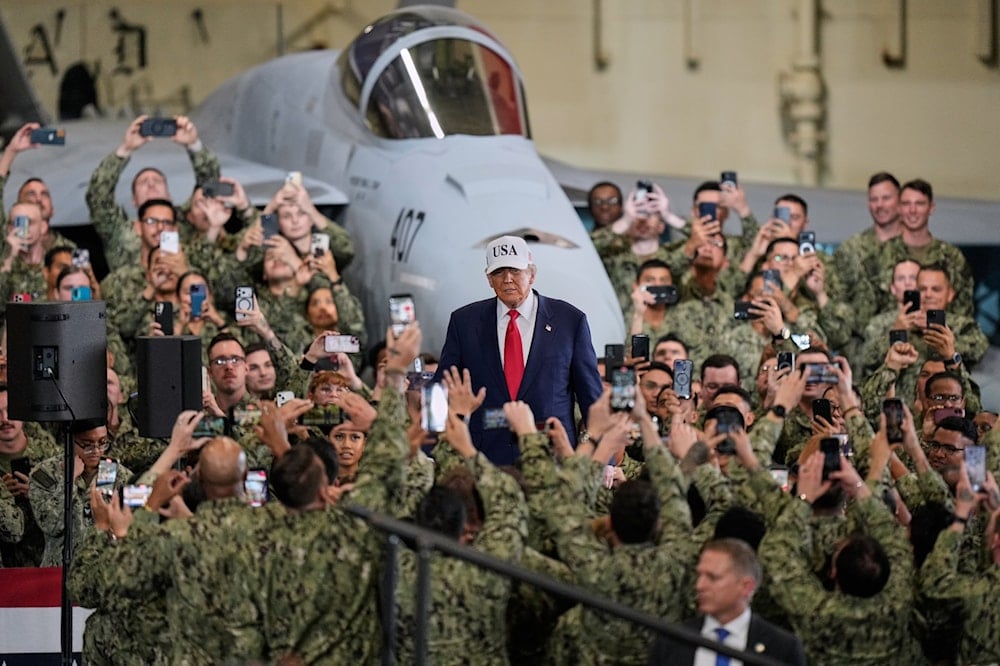Trump admin. plans covert mission allegedly against cartels in Mexico
Trump eyes a bold shift in cartel policy with a secretive US military and CIA mission inside Mexico, risking tensions with Sheinbaum’s government.
-

US soldiers use smartphones to film US President Donald Trump as he arrives to the aircraft carrier USS George Washington at the US Navy's Yokosuka base, in Yokosuka, south of Tokyo, Tuesday, October 28, 2025. (AP)
The Trump administration is in the early stages of planning a covert mission that would send American troops and intelligence officers into Mexico to target drug cartels, two current and two former US officials familiar with the discussions told NBC News.
The proposed operation, which could include drone strikes on cartels, marks a significant escalation in the Trump administration’s military campaign against alleged transnational criminal groups. It would involve US special operations forces and CIA officers operating under Title 50 authority, which governs covert action by the US intelligence community.
While training for the potential mission has already begun, a final decision has not been made. US officials emphasized that no deployment is imminent and that discussions over the mission’s scope remain ongoing.
Read more: Intel reports put to question US claims on Venezuela, drug-trafficking
A break with past policy toward drug cartels in Mexico
Unlike previous US administrations, the proposed mission under US President Donald Trump would authorize direct US action inside Mexican territory.
If approved, the administration plans to keep the mission secret and avoid publicizing any related actions, much like its recent strikes against alleged drug-smuggling boats near Venezuela.
“The Trump administration is committed to utilizing an all-of-government approach to address the threats cartels pose to American citizens,” a senior administration official said.
The CIA declined to comment, and the Pentagon referred all inquiries to the White House when questioned by NBC.
Read more: Trump’s nuclear claims: Misreading strategy as Russia, China modernize
In February, the State Department designated six Mexican drug cartels, along with MS-13 and the Tren de Aragua gang, as "foreign terrorist organizations." The move gave US military and intelligence agencies expanded authority to carry out espionage and covert operations under terrorism-related legal frameworks.
According to US officials, drone strikes on cartel targets inside Mexico would likely focus on drug labs, mid-level commanders, and high-value cartel leadership. Some of the drones considered for the mission require operators to be physically present in the region to be used effectively.
Mexico pushes back as Sheinbaum reaffirms sovereignty
Mexican President Claudia Sheinbaum responded to early reports of the potential US mission by rejecting any unilateral action.
“We reject any form of intervention or interference. That’s been very clear, Mexico coordinates and collaborates, but does not subordinate itself,” she said during a press conference, according to a translation provided by the Mexican Embassy to the US.
Though US officials say they would prefer to coordinate with the Mexican government, they have not ruled out unilateral operations if deemed necessary.
Sheinbaum has permitted the CIA to expand surveillance flights in Mexican airspace, a policy continuation from the Biden administration, and has deployed 10,000 troops to the US border. Her government has also increased fentanyl seizures and extradited 55 senior cartel figures to the US.
Trump has publicly praised Sheinbaum’s leadership, calling her “a tremendous woman", but added, “Mexico is run by the cartels.”
Read more: Mexico mayor shot dead during Day of the Dead festivities
Trump’s broader anti-cartel campaign
The new operation in Mexico would follow Trump’s military actions targeting alleged drug-smuggling boats in the Caribbean and Pacific. Since September, US forces have struck 16 boats near Venezuelan waters, reportedly killing 64 individuals.
The administration has not released evidence confirming the nature of the boats, the identities of those killed, or the alleged narcotics onboard.
Trump argues that traditional law enforcement tactics, including seizures at borders and airports, have failed to stop drug trafficking by gangs allegedly located in Mexico, Venezuela, and other countries. He has described drug cartels as a national security threat and advocated for more aggressive military and intelligence operations.
The effort in Venezuela has also included a pressure campaign against President Nicolas Maduro, whom the US accuses of being part of a drug cartel. The Trump administration has placed a $50 million bounty on Maduro’s arrest.
Officials familiar with the Mexico mission claimed that it is not intended to undermine Sheinbaum’s government but is focused solely on cartel activity. The scope, legality, and coordination of such a mission remain under debate within the administration.
Strikes spark debate over legality, regional impact
The use of military force against alleged drug traffickers, along with the administration’s decision to label some trafficking groups as “terrorist” actors, has drawn scrutiny from legal experts, human rights groups, and some lawmakers.
Critics warn that strikes at sea present complex challenges under international law and question the role of law enforcement agencies such as the US Coast Guard. Administration officials argue the operations are necessary to disrupt networks responsible for mass drug-related deaths in the US.
Mexico and other regional governments have initially responded cautiously. Mexican authorities, who accepted responsibility for a survivor, have in past cases protested unilateral military actions near their waters.
Latin American officials have warned that sustained US operations in the region could cause diplomatic friction.
Read more: Trump builds ballroom as US families go hungry without food aid

 5 Min Read
5 Min Read








